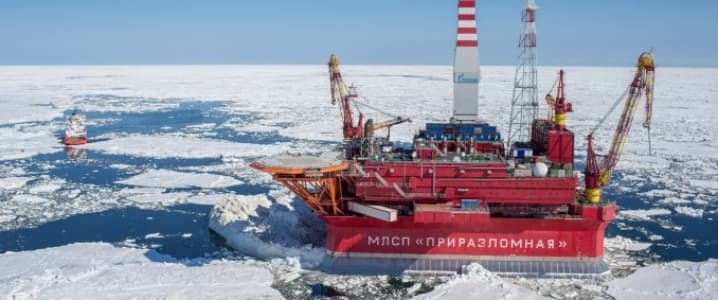Rosneft, Russia’s state-controlled oil company and the largest oil producer in the country, plans to develop an Arctic cluster of oil fields over the next five years.
These plans by Rosneft—led by a close ally of Vladimir Putin’s, Igor Sechin—fit the Russian President’s ambition to develop Arctic oil and gas resources and adjacent regions, as well as the so-called Northern Sea Route—a shipping lane through Russian Arctic waters stretching from Europe to the Far East.
Russia’s Arctic oil development has stalled in recent years due to the western sanctions that have had international majors, including ExxonMobil, pull out of some exploration projects in Russia.
Now Rosneft is pledging increased efforts to fulfill Putin’s Arctic development ambitions, aiming to have first oil produced in the so-called Arctic cluster of fields by 2024 and to boost cargo traffic on the Northern Sea Route.
For Rosneft, the Northern Sea Route, if connected to inland oil fields in Russia’s north, could provide another export avenue for its oil, especially to the markets in Asia.
During a meeting between Putin and Sechin this week, Rosneft’s boss told his boss that the oil giant is currently “considering the possibility to create an Arctic cluster that will fully focus on bringing the cargo traffic in the Northern Sea Route to 80 million tonnes by 2024, as planned,” as per the English translation of the meeting’s transcript provided by the Kremlin. Related: Supermajor Shell Looks To Revitalize The Rust Belt
The development may include Rosneft’s Vankor cluster, Suzun, Tagul, the Lodochnoye deposit, and a number of geological exploratory projects in South Taymyr.
“For example, we have the Yermak project there we have launched jointly with BP, as well as the promising Zapadno-Erginsky area,” Sechin told Putin, noting that a second stage of development, if the resource potential is confirmed, could include reserves in East Taymyr in the Khatanga area.
According to Sechin, “Major Western and Southeast Asian investors” have shown interest in the so-called Arctic cluster, which “will certainly create conditions for an accelerated resource deployment as well as for a comprehensive development of related industries.”
The development of the Arctic oil resources, however, requires an investment-friendly environment that will be crucial to launching such projects, as well as regulatory terms and taxation that won’t change during the projects’ lifetime, be it 30 or 50 years, Sechin told Putin.
Stable regulatory environment will help attract additional investors, especially from outside Russia, according to Rosneft’s boss.
Another important point in Sechin’s report to the Russian President was that the Northern Sea Route needs to be economically viable if it were to achieve Putin’s ambition for developing the Arctic resources and regions.
“Given the availability of alternative logistical options, the Northern Sea Route should be as economically viable for the projects as alternative routes. In this regard, we formulate our proposals, submit them to the Government, and we will continue to do this work,” Sechin told Putin.
At the end of February this year, Russian business daily Kommersant reported, quoting sources, that Rosneft had decided to significantly contribute to raising the cargo traffic on the Northern Sea Route by redirecting oil from the new fields of the Vankor Cluster by building a 600-kilometer-long (373 miles) pipeline to the coast of Taymyr. Related: New Offensive Brings Libya To The Brink Of War
Russia’s Energy Minister Alexander Novak also spoke this week about the ‘huge development potential’ of Russia’s Arctic projects.
Russia is currently working on the timeframe for the development of the large Payakhskoye oil field, potentially using the Northern Sea Route, Novak said in a media interview this week published on the energy ministry’s website.
ADVERTISEMENT
Arctic projects hold huge potential for the development of Russia’s energy sector, Novak said.
It remains to be seen if Russia’s biggest companies can develop the Arctic on their own, if Russia can attract foreign investments in its ambitious projects, and if the Northern Sea Route can become a viable economically-competitive route for cargo traffic.
By Tsvetana Paraskova for Oilprice.com
More Top Reads From OIlprice.com:
- What’s Next For Algeria As Bouteflika Steps Down
- Shale Is In A Deep State Of Flux
- Why Oil Markets Need New OPEC+ Cuts



















These plans aim to exploit the vast oil and gas recoverable reserves in the Arctic estimated at 90 billion barrels (bb) of oil and 47 trillion cubic meters (tcm) of natural gas of which Russia has the largest share estimated at 48 bb of oil and 43 tcm of gas as well as developing the so-called Northern Sea Route—a shipping lane through Russian Arctic waters stretching from Europe to the Far East.
The objective is to have an estimated 1.6 milon barrels a day (mbd) added to Russia’s production of 11.4 mbd by 2024 from the Arctic region where ExxonMobil and Rosneft were operating together before US sanctions forced ExxonMobil to withdraw its operations.
And despite the harsh weather conditions in the Arctic region, Russia has been expanding its Arctic infrastructure with massive investments which dwarf those of the remaining littoral states and also state-of- the-art technology.
Russia regards the Arctic as a strategic area where it is willing to invest significantly to secure the largest and most important share for itself. Despite significant investments, extracting oil and gas has not been an easy task for Russian energy companies. Notable successes are Novatek’s Yamal LNG and Gazprom Neft’s Novy Port project. To complete such projects, unique and extensive Arctic infrastructure was needed along with a new breed of vessel: the LNG ice-breaker tanker which can sail in ice of up to 2.1 metres thick.
Dr Mamdouh G Salameh
International Oil Economist
Visiting Professor of Energy Economics at ESCP Europe Business School, London